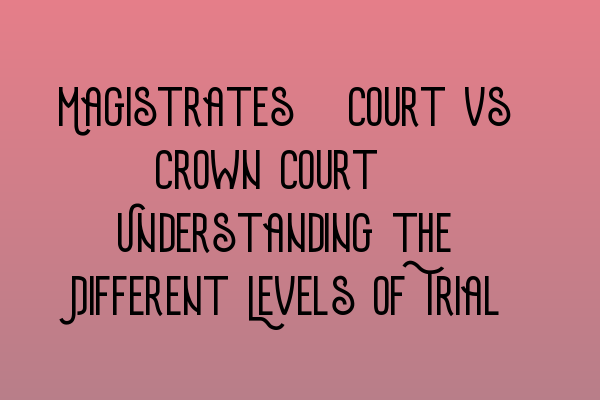Magistrates’ Court vs Crown Court: Understanding the Different Levels of Trial
Welcome to the SQE Criminal Law & Practice Law UK blog! In this article, we will be exploring the differences between Magistrates’ Court and Crown Court trials. Understanding these two levels of trial is essential for aspiring solicitors and barristers.
Magistrates’ Court
Magistrates’ Court is the lower level of trial in the English legal system. It deals with less serious criminal offenses and is presided over by a panel of lay magistrates or a District Judge. These trials are typically shorter, less formal, and address minor offenses such as theft, public order offenses, and traffic offenses.
At Magistrates’ Court, there is no jury, and the trial is conducted by the magistrates or the District Judge. The magistrates are members of the local community who have undergone training to handle these cases. They make decisions based on the evidence presented in court and the relevant laws.
If the accused pleads guilty, the magistrates will generally impose a sentence. If the accused pleads not guilty, a trial will be conducted to establish their guilt or innocence. If convicted, the magistrates have the power to impose a sentence of up to six months imprisonment, a fine, or community service.
For those who wish to practice law and deal with Magistrates’ Court cases, it is crucial to familiarize yourself with the SQE 1 Practice Mocks FLK1 FLK2 and the SQE 2 Preparation Courses. These resources will help you develop the necessary skills and knowledge required in this area of law.
Crown Court
Crown Court is the higher level of trial in the English legal system. It deals with more serious criminal offenses, such as murder, rape, or fraud. Trials at Crown Court are presided over by a judge and a 12-member jury, who are responsible for determining guilt or innocence.
Crown Court trials are generally longer and more formal compared to those at Magistrates’ Court. The prosecution presents its case, followed by the defense, and the jury decides the outcome based on the evidence presented. If the accused is found guilty, the judge will hand down the appropriate sentence, which can range from community service to life imprisonment.
For aspiring solicitors and barristers who desire to work on cases at the Crown Court level, it is essential to be well-prepared with relevant knowledge and skills. Consider taking the SQE 1 Practice Exam Questions and enrolling in the SQE 1 Preparation Courses. These resources will enhance your understanding and expertise in dealing with Crown Court trials.
Conclusion
In summary, the Magistrates’ Court and Crown Court represent two distinct levels of trial in the English legal system. Magistrates’ Court handles less serious offenses and is presided over by magistrates or a District Judge, while Crown Court deals with more serious offenses and is presided over by a judge and a jury. By understanding the differences between these two levels, aspiring law professionals can better prepare themselves for their chosen field of practice.
Stay updated with the latest in SQE Criminal Law & Practice Law UK by checking out our SRA SQE Exam Dates article.
